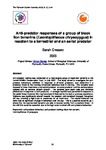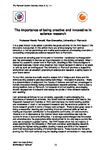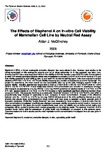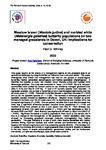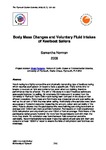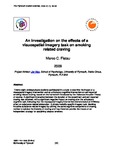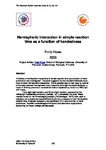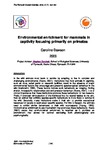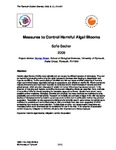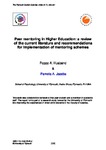The Plymouth Student Scientist - Volume 2, No. 1 - 2009
Table of contents
Guest editorial
The importance of being creative and innovative in science research, Wendy Purcell, p.1-2
Project Articles
Anti-predator responses of a group of black lion tamarins (Leontopithecus chrysopygus) in reaction to a terrestrial and an aerial predator, Sarah Creasey, p. 3-24.
The Effects of Bisphenol A on in-vitro Cell Viability of Mammalian Cell Line by Neutral Red Assay, Aidan J McGlinchey, p. 25-31.
Injuries inflicted as a predictor of winning in contests between beadlet anemones, Actinia equina, Laura Robinson, Ben Porter, Jennifer Grocott, Kendal Harrison, p. 32-49.
Meadow brown (Maniola jurtina) and marbled white (Melanargia galathea) butterfly populations on two managed grasslands in Devon, UK: Implications for conservation, Paul G Winney, p. 50-68.
An investigation on the effects of a visuospatial imagery task on smoking related craving, Marco C. Flatau, p. 69-89.
Hemispheric interaction in simple reaction time as a function of handedness, Emily Howe, p. 90-107.
Environmental Issues in Surfing – Behaviours and Attitudes, Henry J B Davies, p. 108-155.
Body Mass Changes and Voluntary Fluid Intakes of Keelboat Sailors, Samantha Norman, p. 156-183.
Literature Reviews
Environmental enrichment for mammals in captivity focusing primarily on primates, Caroline Dawson, p. 184-194.
Influences on the cleaning activity and distribution of cleaner fish, Katherine Gray, p.195-202.
Deep-Sea Coral Reefs: Distribution, Ecology & Anthropogenic Impacts, Victoria Oakham, p. 203-211.
Measures to Control Harmful Algal Blooms, Sofie Secher, p. 212-227.
Special Interest Article
Peer mentoring in Higher Education: a review of the current literature and recommendations for implementation of mentoring schemes [STUDENT/STAFF RESEARCH COLLABORATION], Poppy A Husband, Pamela A Jacobs, p. 228-241.
Recent Submissions
-
Anti-predator responses of a group of black lion tamarins (Leontopithecus chrysopygus) in reaction to a terrestrial and an aerial predator
(University of Plymouth, 2009)Anti-predator training was conducted on a free-ranging group of black lion tamarins at the Durrell Wildlife Conservation Trust, in July 2007. The study aimed to investigate the anti-predator behaviours exhibited in response ... -
The importance of being creative and innovative in science research
(University of Plymouth, 2009)Guest editorial from the Vice Chancellor (University of Plymouth) -
The Effects of Bisphenol A on in-vitro Cell Viability of Mammalian Cell Line by Neutral Red Assay
(University of Plymouth, 2009)Bisphenol-A (BPA), a known oestrogenic endocrine disruptor, has many effects in-vivo. However, most studies on its effects concentrate on this oestrogenic property and not on direct cytotoxicity. An in-vitro approach was ... -
Meadow brown (Maniola jurtina) and marbled white (Melanargia galathea) butterfly populations on two managed grasslands in Devon, UK: Implications for conservation
(University of Plymouth, 2009)This paper reports on the effects of a management regime on two grassland sites in an agricultural landscape by using butterflies as indicators over a six-year period. This paper investigates what effects the management ... -
Body Mass Changes and Voluntary Fluid Intakes of Keelboat Sailors
(University of Plymouth, 2009)Match racing is a highly competitive and physically demanding type of keelboat racing which requires each person on board to have a specific job. There is little time for breaks to re-stock on fluid and nutrients lost, ... -
An investigation on the effects of a visuospatial imagery task on smoking related craving
(University of Plymouth, 2009)Twenty eight undergraduate students participated in a study to examine the impact of a visuospatial imagery intervention and an articulatory cognitive intervention on self-reported smoking related craving, based on the ... -
Hemispheric interaction in simple reaction time as a function of handedness
(University of Plymouth, 2009)Efficiency of hemispheric interactions in simple reaction time as a function of hand preference was investigated. Research suggests that left-handed individuals have more efficient hemispheric interactions. This is possibly ... -
Environmental enrichment for mammals in captivity focusing primarily on primates
(University of Plymouth, 2009) -
Measures to Control Harmful Algal Blooms
(University of Plymouth, 2009)Harmful algal blooms (HABs) occur globally and are caused by different species of microalgae. They can be harmful by producing toxins or by the rapid increase in biomass often leading to discoloration and hypoxic conditions. ... -
Peer mentoring in Higher Education: a review of the current literature and recommendations for implementation of mentoring schemes
(University of Plymouth, 2009)


